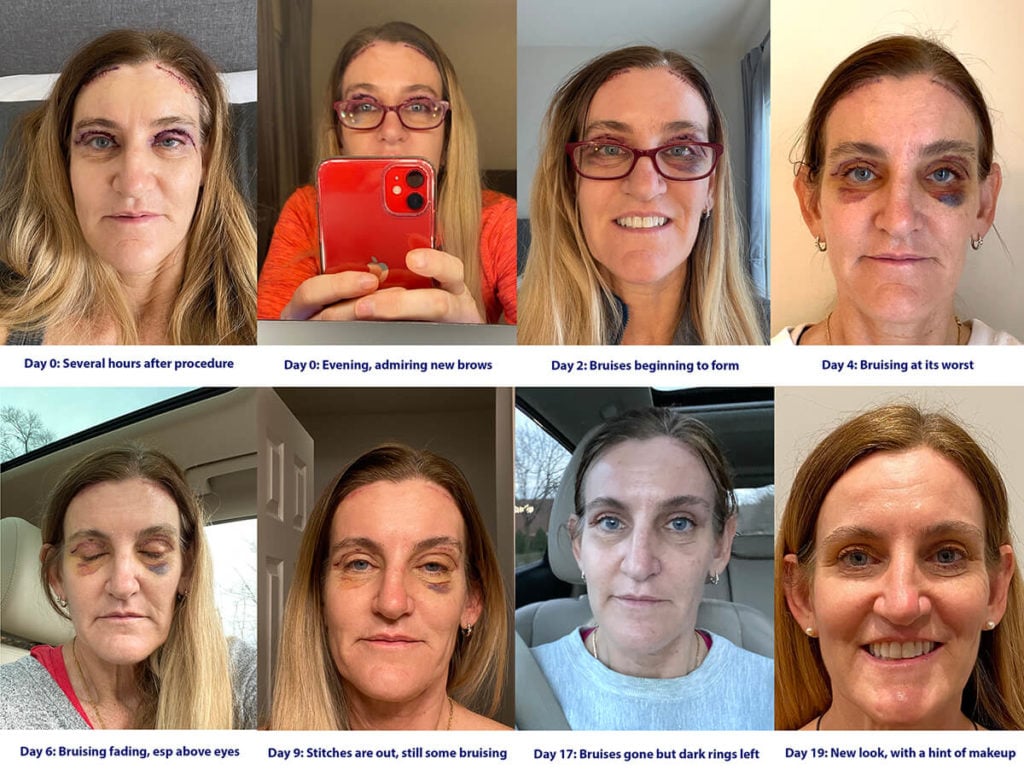
Medically reviewed by Dr. John Rosdeutscher – Written by Sine Thieme
Eyelid surgery (also called blepharoplasty) is a surgical cosmetic procedure. This means that a surgeon places incisions and sutures that need time to heal. How much time? We’ve put together the following information for patients who want to learn more.
How Long is the Recovery Time for Blepharoplasty?
While recovering from eyelid surgery is not especially difficult, with patients being able to return to their daily activities 1-2 days after their procedure, the so-called social recovery – the period you might not want to show your face in public before it is completely healed – may take as long as 7-10 days. By 2 weeks after their procedure, most patients are so far recovered that it is hard to detect any signs of surgery, and what scarring remains is easily touched up with a little makeup.
What Will My Face Look Like After Eyelid Surgery?
We think the best way to get an idea of what you will look like post eyelid surgery, and for how long, is to give you an example of a real-life patient. Every person is different and your healing may progress faster or slower depending on various factors, but the below example of NuBody Concepts patient Eva G should give you an approximate idea of what to expect:

To read more about the above patient’s eyelid surgery experience, follow her 3-part blog series on her eyelid surgery with brow lift in November of 2021:
The timeline below gives additional information for what to expect in the weeks following your eyelid surgery.
Follow Your Post-Op Instructions
Your plastic surgeon will have given you detailed directions to follow both before and after your surgery. Written instructions should be given to you before the procedure so that you have them at your fingertips afterwards. Make sure you ask many questions to know exactly what is expected.
The instructions should include an after-hours emergency contact phone number or nurse’s hotline you can call with any concerns. They should list any medicine you should be taking to promote healing – if they include antibiotics, make sure you finish the entire course. If you have any prescription medications you normally take, be sure to ask when it is safe to resume them.
Directly After the Surgery
The physical recovery time after a blepharoplasty is typically fairly short. During your surgery you will be placed under IV sedation. This is similar to the level of sedation you typically receive for wisdom teeth removal or a colonoscopy. Typically, your doctor will instruct you to arrange for a friend or family member to drive you home. Uber drivers do not typically qualify as designated drivers after surgery.
Your surgeon may have placed thin bandages over the incision sites. If so, these can be removed a few days post-op. However, bandages are not necessary, and many surgeons will leave your stitches uncovered. The stitches will remain in your skin for about a week and, if the surgeon used self-absorbing stitches, will typically not require an additional visit to have them removed. If they do require removal, it is normally done sooner than later – the shorter time the stitches remain in the skin, the less likely will they cause any additional scarring. Your surgeon will schedule your post-op visit accordingly and it is important to adhere to that timeline.
1-6 Days Post-Op
Bruising and swelling is a common consequence of any kind of surgery, and eyelid surgery is not exempted. The bruising will typically set in on Day 2 and be at its worst for the next couple of days. It’s usually not very painful but the area under your eyes may look like you’re a prizefighter. Using a cold compress for the first 48 hours post-op will help reduce any painful swelling around your eyes and face you might experience. You are also advised to sleep on your back with your head elevated for at least a week following surgery.
As the days go by, the bruising changes in color and travels down towards your cheeks. The more closely you follow your surgeons post-op instructions to prevent bruising and swelling, the less pronounced it will be and the faster it will subside. Your doctor may recommend light activities, such as walking, to help your body recover.
7-14 Days After Eyelid Surgery
In most cases, many patients are able to return to their daily activities within the first seven to ten days following their procedure. If your surgeon has used regular stitches, you will need to go in for your post-op visit to have them removed. This is typically done at the 7-day mark.
By the end of the second week, most of the bruising and swelling will resolve. You will be encouraged to continue using a scar healing cream and/or sunscreen and to keep your eyes covered long after your procedure so as not to let your scar tissue become discolored. Sun sensitivity after your surgery may continue up to a year, so it is important to protect your eyes from direct sunlight with glasses, visors, and other means.
When Can I Resume Exercise After Eyelid Surgery?
As mentioned above, eyelid surgery does not require a long physical recovery. You should be able to resume your daily activities within 1-2 days after your procedure, and you should not need any pain medication after the first 2 days.
Patients are advised to wait with any strenuous exercise until all the bruising and swelling has subsided. Increased blood flow from an increased heart rate may hinder healing and extend bruising and swelling. However, as with any surgical procedure, it is important to start moving again as soon as you are able.
We hope we have helped you decide which type of eyelid surgery might be best for you. If you’d like to discuss your goals with a plastic surgeon, please contact us or click the pink button to schedule a consultation.












